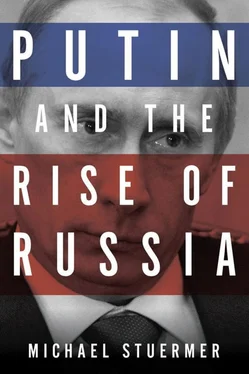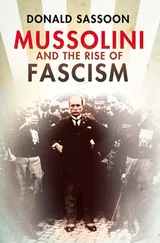The question remains: is there still a political agenda, a system of thought, a pattern of interests, a global vision constituting the West? The answer is no when defined in terms of the Cold War: the organizing principle was containment of the Soviet Union, and with the Soviet Union the organizing principle has gone too. The answer is also yes when defined in terms of soft power and political culture, open society and the right to the pursuit of happiness.
But where is the moral and political place of Russia in all of this, now and in the foreseeable future? Russia has gone through one or two burnouts, and this can be seen in the body language of the older generation, in the massive exodus of elites, and the conditioned reflex of the security services to take control. Russia, in spite of appearances, goes back to its roots – this could be one answer, and both the siloviki in the Kremlin and the weakness of civil society could be cited as proof, together with the burden of history and the age-old instinct of Russians to define themselves in defiance of Europe and the US.
There is also another answer, however, and it holds out more hope for Russia and its neighbours far and wide. No return to the leaden years of Brezhnev or the brutal suppression under Stalin and Lenin. Russia is reinventing itself, and the vast natural resources of Siberia at rising world market prices are a chance both to create firm financial ground and to compete with Western countries. Of course Moscow will not soon accept the European Union as a major player in its own right on the world scene but will try, whenever possible, the bilateral track. And Moscow will, whenever possible, try to enhance differences across Europe and between Europeans and Americans. This is nineteenth-century great power diplomacy played out in an early twenty-first-century environment – and that is why it cannot be the winning strategy. The interdependence of highly industrialized countries in terms of global challenges is too vast, the punishment for unilateralism too severe, the lure of the West throughout the Russian population is far greater than anything China has to offer. The idea in Moscow that a systemic conflict is developing between on one side countries combining capitalism and authoritarianism and on the other side countries opting for liberal capitalism is academic, because it ignores the geopolitics of Asia in general, and Siberia in particular.
Ever since Russia became part of the power play of Europe, i.e. more than three hundred years ago, for all its exceptionalism Russia has been a European power with a vast Asian hinterland. ‘Europe our common house’ was, in Gorbachev’s time, less of a propaganda slogan and more of a vision. Today the democratic subtext of this vision has faded, but the material base has grown. Russia and the countries of Europe, Russia and the US will, whether they like it or not, share a common destiny.
12
Epilogue: the making of a president
‘Do not reproach me for my contradictions. I perceived them without wishing to avoid them, for they exist in the things that I describe – let this be said once and for all. How can I give you a true idea of what I am describing without contradicting myself at every word?’
Marquis de Custine,
Journey for Our Time
Britain’s Prime Minister Winston Churchill once described viewing the Kremlin’s political machinations as like watching a fight among bulldogs under a carpet; outsiders hear plenty of growling but have few clues about the outcome until the victor emerges. Soviet times or no, the analogy was present in the minds of those who tried to make sense of the twists and turns – and surprises – ultimately leading to the nomination of Dmitri Medvedev by the incumbent president to be his successor – with the Russian electorate offered the chance to cast – or withhold – a vote on 2 March 2008. In the case of Dmitry Medvedev, once he had been anointed in mid-December 2007 by Putin, public consent was less of a drama. Medvedev, when running for election, was in a one-horse race. Putin’s backing virtually assured Medvedev of the chief prize. In addition the Kremlin made sure, through applying gentle and not so gentle pressure by the police and the internal intelligence services that the media were restrained and that no outsider had much of a chance in the run-up to the electoral contest.
In fact the elections were stage-managed but not manufactured. Russian imaginations were hardly set alight. Apart from Medvedev, the other candidates on the ballot paper were communist and nationalist has-beens and a little known liberal who praised Medvedev. There were no serious competitors; those who were on the list only served the purpose of underlining the reasonableness of the Kremlin’s official candidate. A few weeks before the elections Mikhail Kasianov, until 2004 Putin’s reform-minded prime minister and the best hope for Russia’s marginalized liberals, had been barred from taking part on a formality: the authorities insisted that some signatures on his list were forged. Kasyanov spoke of a ‘coordinated campaign of pressure’. To preserve a façade of public enthusiasm the Kremlin put pressure on people to go and cast their vote, thus underlining the popular character of the elections. In the end, Medvedev collected close to 70 per cent of the vote – a far cry from the hollow 99 per cent usually announced after Soviet ‘elections’. The pessimistic interpretation is that the elections were a demonstration of Kremlin control over hearts and minds. The optimistic interpretation would be that Russia is in transition, that ‘administered democracy’, as the Kremlin coined the phrase, is better than no democracy and that at least the basic principle of democratic legitimacy had been upheld. Only time will tell which interpretation carries more truth.
But stating that the elections did not spring any surprises is not to say that what comes after the election in terms of policies and personalities will be a foregone conclusion. Putin himself, when asked about becoming prime minister, had answered: ‘Quite a realistic proposal.’ But to Russians and non-Russians alike the idea of having the Tsarevitch in the Kremlin and the Tsar in the White House sounds unlikely, and is indeed fraught with uncertainty. The last thing Russians want is to put at risk the precious stability they have gained over the last eight or so years. The newfound well-being is mostly a function of soaring oil prices. But in the imagination of most Russians it is, above all, a product of Putin’s statesmanship. Dual rule? For most Russians this would herald a new time of troubles.
Medvedev himself seems to have felt this unspoken question when, immediately after thanking the President for his nomination he added that, surely, once elected, he would need advice and support from Vladimir Putin. Was this an excessive measure of humility, or the indication of an early deal to step down after a while and make room for the predecessor to be his own successor? Or, most likely, was it simply an indication that even the masters of the Kremlin were not sure of what would come next? Before and after the election, the opaque nature of Russian politics keeps Russians guessing – and the rest of the world too.
The battle for the presidency could have been cut short by the incumbent himself had he followed earlier suggestions from United Russia activists simply to manufacture a two-thirds majority in the Duma, change the letter of the constitution – perfectly legal if a two-thirds majority so wishes – and allow himself a third term, possibly of long duration. This would have answered the universal call for stability, prevented any scramble to succeed the incumbent and answered the question on everybody’s mind as to what the former president would do after leaving the innermost sanctum of the Kremlin: not leave the Kremlin.
Читать дальше











